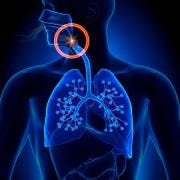CPAP better than oxygen for obstructive sleep apnea

About half of people diagnosed with obstructive sleep apnea (OSA) can't or won't use the most effective therapy, overnight continuous positive airway pressure (CPAP). Most people with untreated OSA experience multiple episodes of hypoxemia -- sometimes hundreds per night. For many patients declining CPAP treatment, their doctors provide overnight oxygen, in the hope that it might ameliorate some of the risks of untreated sleep apnea.
Supplemental nocturnal oxygen does improve arterial oxygen saturation during sleep. However, it also appears to increase the severity of apnea-hypopnea events, which have been theorized to have distinct deleterious effects on the heart independent of hypoxemia. For this reason, supplemental oxygen therapy is not recommended as a primary therapy for obstructive sleep apnea in expert guidelines.
As in many consensus guidelines, though, there is virtually no good outcomes data to support or refute the use of supplemental oxygen for obstructive sleep apnea. The HeartBEAT trial, reported in the June 12 2014 New England Journal of Medicine, provides a little.
Authors enrolled 318 patients with moderate to severe OSA and known cardiovascular disease or multiple cardiovascular risk factors. Patients were randomized to receive either nocturnal oxygen alone (without CPAP), or CPAP alone (without extra oxygen), or education on sleep hygiene and healthy lifestyle alone (controls).
Both CPAP and nocturnal oxygen improved nighttime hypoxemia by a similar degree. CPAP improved blood pressure slightly relative to the oxygen-only or control groups (by about -2.5 mm Hg at 12 weeks). Each additional hour of CPAP use reduced blood pressure by ~1 mm Hg systolic.
The benefits were seen even in patients without daytime sleepiness. The absence of daytime somnolence has been considered by some to be a marker for less-risky obstructive sleep apnea.
CPAP has never been proven to reduce cardiovascular events in OSA, but there's abundant physiologic and observational evidence suggesting CPAP can save lives in people with preexisting cardiovascular disease. (These studies are limited by "confounding by adherence" -- those complying with therapy likely tend toward health in other unmeasured ways.) Some theorize that CPAP's reduction in the wide swings in intrathoracic pressure that occur during apneas, in addition to the reduction in mean blood pressure, may protect the heart.
Given those likely risks, it's a bit surprising that it was considered ethical to randomized patients with high cardiovascular risk and severe OSA to receive no therapy. The short trial duration (12 weeks) did reduce the risk.
In a separate trial also reported in the New England Journal, patients with obstructive sleep apnea randomized to weight loss (alone or with CPAP) experienced greater reductions in C-reactive protein, compared to those randomized to CPAP alone. All 3 groups experienced equivalent minor improvements in blood pressure.
The U.S. government (National Institutes of Health Heart, Lung Blood Institute or NHLBI) funded both studies.
Gottlieb DJ, et al "CPAP versus oxygen in obstructive sleep apnea" N Engl J Med 2014; 370: 2276-2285.
Chirinos JA, et al "CPAP, weight loss, or both for obstructive sleep apnea" N Engl J Med 2014; 265-2275.
Basner RC "Cardiovascular morbidity and obstructive sleep apnea" N Engl J Med 2014; 370: 2339-2341.


